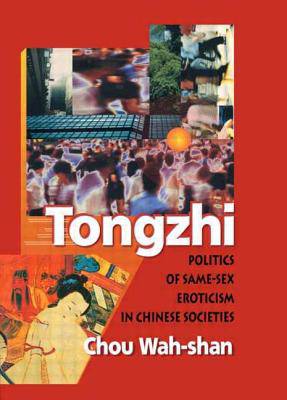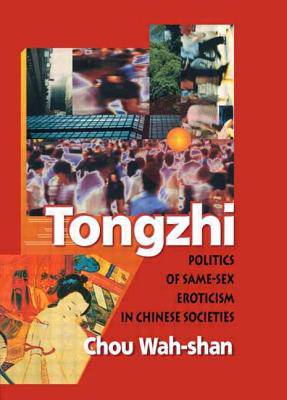
- Retrait gratuit dans votre magasin Club
- 7.000.000 titres dans notre catalogue
- Payer en toute sécurité
- Toujours un magasin près de chez vous
- Retrait gratuit dans votre magasin Club
- 7.000.0000 titres dans notre catalogue
- Payer en toute sécurité
- Toujours un magasin près de chez vous
Tongzhi
Politics of Same-Sex Eroticism in Chinese Societies
Edmond J Coleman, Wah-Shan ChouDescription
Tongzhi: Politics of Same-Sex Eroticism in Chinese Societies examines Chinese societies where the family-kinship system, rather than sexuality, is taken as the basis of an individual's identity. With Tongzhi, you will come to understand the variations of same-sex erotica in different Chinese societies. Examining past and present treatment of the subject, including instances of discrimination against homosexuals, Tongzhi explores same-sex eroticism in China, Hong Kong, and Taiwan, and explains the variations of categories and experiences of tongzhi in these countries. Just what is Tongzhi?Tongzhi is the most popular contemporary Chinese word for lesbians, bisexuals, and gay people. The word, which has very positive historical references, was a Chinese translation from the Soviet communist term comrade. It was appropriated by a Hong Kong gay activist in 1989 for the first Lesbian and Gay Film Festival in Hong Kong by its organizers, who wanted to employ an indigenous representation of same-sex eroticism. The term 'homosexual'was inappropriate because of its use as a medical term denoting sickness and pathology. Within a few years, tongzhi became a widely used term in Hong Kong and Taiwan and is often used interchangeably with the English term gay. But terms such as gay, lesbian, and queer are Anglo-Saxon in origin, with specific histories that cannot capture the indigenous features of Chinese same-sex relationships. Tongzhi implies and includes much more. S/Mers, transvestites, and other fetishists who are members of the Chinese sexual counterculture who may be quite heterosexual are also tongzhi. And the term has meaning beyond the sexual: it embodies a strong sentiment for integrating the sexual (legitimizing same-sex love), the political (sharing the goals of fighting heterosexism) and the cultural (reappropriating their Chinese identity). Tongzhi brings you fascinating insight into:
- the history of same-sex eroticism in China
- coming out in Chinese society
- how colonialism has affected sexual nonconformists in this region
- racial and sexual dynamics in Colonial Hong Kong
- the cultural politics of being a tomboy/girl in modern Hong Kong
- "queering the mainstream" with tongzhi identity politics
- sexual/cultural diversities and differences among contemporary Chinese societies . . . and much more!
Tongzhi shows how culture influences identity and demonstrates how you can develop relevant strategies for successful activist movements. Discussing political movements for gay/lesbian/bisexual rights and the societal implications of same-sex eroticism, this intelligent book provides you with a clear understanding of the attitudes toward and meanings of being tongzhi today.
Spécifications
Parties prenantes
- Auteur(s) :
- Editeur:
Contenu
- Nombre de pages :
- 352
- Langue:
- Anglais
Caractéristiques
- EAN:
- 9781560231547
- Date de parution :
- 11-08-00
- Format:
- Livre broché
- Format numérique:
- Trade paperback (VS)
- Dimensions :
- 152 mm x 213 mm
- Poids :
- 498 g

Les avis
Nous publions uniquement les avis qui respectent les conditions requises. Consultez nos conditions pour les avis.






